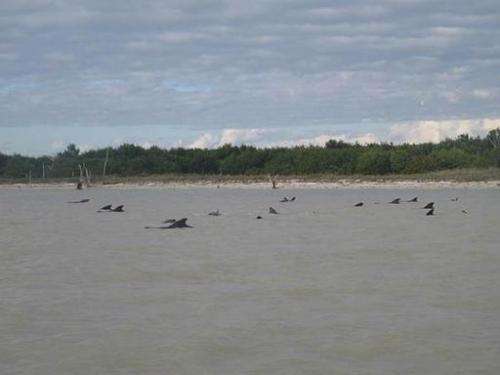This photo obtained December 5, 2013 courtesy of the US National Park Service shows pilot whales stranded on December 4, 2013.
The fate of some 40 stranded whales off Florida was unclear Friday, with officials saying they had lost track of two dozen but were hopeful these had swum to safety.
Twenty-four of the mammals were unaccounted for, Blair Mase of the National Oceanic and Atmospheric Administration told reporters, calling the development "encouraging."
We are "hoping they are out to sea," she said in a conference call.
But, she added, that was "not certain."
Eleven of the pilot whales have died since the mysterious mass stranding in a remote area off the US state's Everglades National Park was first reported on Tuesday, with rescuers racing against time to save the rest.
Of those that perished, four had to be euthanized after they became unable to breathe, hydrate and feed in the shallow waters less than three feet (0.9 meters) deep off Highland Beach.
Others are unaccounted for amid fears they died and sank to the ocean floor.
Seven whales in dangerously shallow waters of 12 to 14 feet (3.6 to 4.3 meters) were being monitored Friday about 5 miles (8 kilometers) offshore and southwest of where they were originally stranded, Mase said.
Another two were "swimming freely" around Plover Key, she said, adding a biologist was on his way to the area to assess their condition.
While a preliminary NOAA assessment put the total number of stranded whales at 51, officials said Friday they did not have an exact figure.
On Thursday, a rescue team of experts from several agencies, including the National Park Service and the US Coast Guard, grew from 25 to 35 scientists and stranding specialists who were only able to reach the whales by boat.
But with the clock ticking, NOAA has stressed the rescuers were treading cautiously as sharks have been seen feeding on the dead whales' carcasses.
It was still unclear why the whales swam to the warm, shallow waters.
Mase said that necropsies carried out so far had not revealed any significant findings but that specialists were awaiting pathology results to see whether disease was to blame.
"The possible causes of this situation are still unknown for us. Marine biologists said that it's hard to know why they behave like that," said Mary Plumb, a spokeswoman for the Everglades National Park, told AFP late Thursday.
In the absence of concrete findings, some experts and animal welfare organizations speculated that possible disorientation after a maritime explosion or a disorder caused by environmental pollution that leads to suicide may have played a role.
Rescuers began their efforts Tuesday after park rangers were told that four whales were stranded. When teams arrived at the scene they discovered a much larger number.
But their endeavors—and the subsequent monitoring of the mammals—were complicated by the fact that the beaching occurred in a very isolated part of southern Florida where there is no cell phone reception.
At least one helicopter has been used in the effort.
The Everglades National Park provides a unique habitat for a range of species, including crocodiles.
Pilot whales are very cohesive among themselves, and usually travel in big family groups.
The mass beaching is not a first. Last year, more than 20 pilot whales were stranded in the Florida Keys while last September just five survived after they, too, lost their way.
© 2013 AFP























